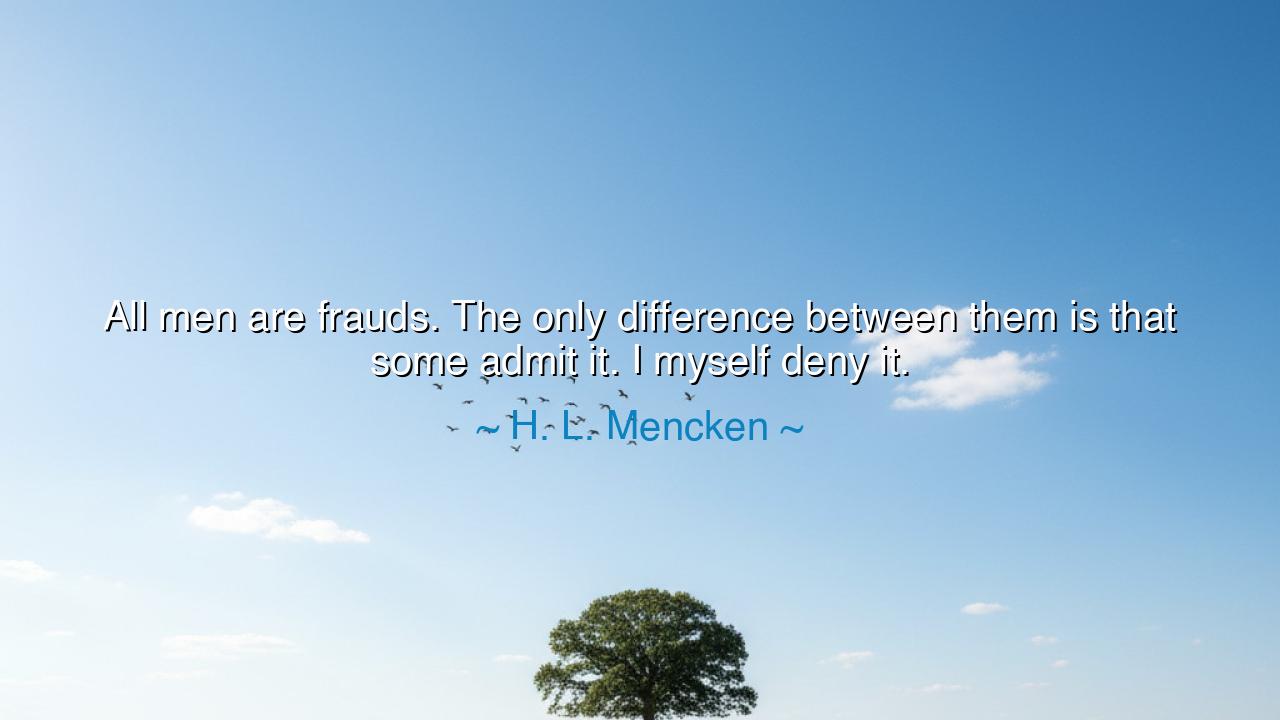
All men are frauds. The only difference between them is that some
All men are frauds. The only difference between them is that some admit it. I myself deny it.






In the depths of the human experience, there lies a truth so profound that it cuts through the veil of our pretensions, exposing the fragility of the human condition. The words of H.L. Mencken—“All men are frauds. The only difference between them is that some admit it. I myself deny it”—reveal an unsettling yet crucial reality: that beneath the surface of every human being lies a contradiction, an inherent imperfection that is often hidden beneath layers of pride, illusion, and self-deception. To understand this quote is to confront the uncomfortable truth about ourselves—that we are all, in some way, playing roles, projecting images of strength, nobility, or wisdom that we may not fully embody.
The ancients knew this well, for their wisdom was built on the understanding that human nature is fraught with conflict. Socrates, the great philosopher, famously declared, “The only true wisdom is in knowing you know nothing.” This statement was not a sign of self-doubt, but of clarity—recognizing that we are all bound by the limits of our own knowledge, our own mortal perceptions. Socrates understood that to be human is to be flawed, to be a creature of both virtue and vice, and that any claim to absolute truth or purity is inherently false. Mencken’s words echo this sentiment, for to claim oneself without flaws is to engage in the greatest fraud of all: the denial of the truth about one’s own nature.
This admission of fraudulence does not, however, condemn us. On the contrary, it provides us with an opportunity for growth and honesty. In the world of the ancients, there were many who could see the illusions of life and were willing to face them. Consider the story of Marcus Aurelius, the great Roman Emperor and Stoic philosopher. Despite his immense power and position, he wrote extensively in his private journals about the human flaws that he sought to understand and overcome. He acknowledged that, though he was a ruler, he was still a man—a man capable of making mistakes, of being led by emotion and desire. Aurelius didn’t deny his imperfections; rather, he embraced them, seeing them as a natural part of the human experience that could be transformed through self-awareness and virtue. Mencken’s remark about denial is a warning not to hide behind false pretensions, but to confront the truth of our humanity.
To admit one’s flaws is, in some ways, to become free. It is a liberation to strip away the falsehoods we tell ourselves and to stand naked before the world, embracing our imperfections. But this freedom is not for all, as Mencken himself points out. Some, in their pride or fear, refuse to face the truth. They wrap themselves in the armor of falsehood, believing that to admit vulnerability is to be weak. It is this tension between truth and illusion that defines the struggle of every human being. Some of us walk this earth with the burden of self-awareness, knowing full well that we are not perfect, while others, wrapped in their own illusions, may walk in a foolish certainty that they are beyond reproach.
Consider the example of Napoleon Bonaparte, the emperor whose arrogance often clouded his judgment. Napoleon was a master of deception, not just in his tactics of war, but in how he presented himself to the world. His image as a military genius, as a leader above all others, was carefully crafted and upheld, despite the very human flaws he possessed. Napoleon refused to acknowledge his own weaknesses and, in doing so, he eventually led himself to ruin. His downfall was not simply the result of his military defeats, but of his refusal to face the truth about himself—the fraudulence of his self-image. Mencken’s words thus serve as a reminder: to refuse to admit our flaws is to set ourselves up for a fall. True strength lies in the acceptance of our imperfections and the courage to move forward in spite of them.
The lesson we can take from Mencken’s sharp observation is this: do not deceive yourself with the notion that you are perfect, nor should you demand perfection from others. Instead, embrace the truth of human nature—acknowledge your own fraudulence, but do not wallow in it. Growth comes not from denying our flaws, but from recognizing them and striving to do better. Just as the ancients sought wisdom in acknowledging their own limitations, so must we. To deny our flaws is to hide from the reality of our own existence, but to acknowledge them is to begin the journey of self-awareness and transformation.
Therefore, let us walk this earth not as those who wear masks, hiding our true selves, but as those who are willing to stand in the light of truth, to acknowledge our fraudulence, and to strive toward growth. We are not gods, nor are we perfect beings. We are flawed, human, and capable of great things precisely because of, not in spite of, our imperfections. Let us not fear to admit our faults, for in doing so, we make space for the very wisdom that comes from knowing who we truly are. In that wisdom, we find our greatest strength.






AAdministratorAdministrator
Welcome, honored guests. Please leave a comment, we will respond soon